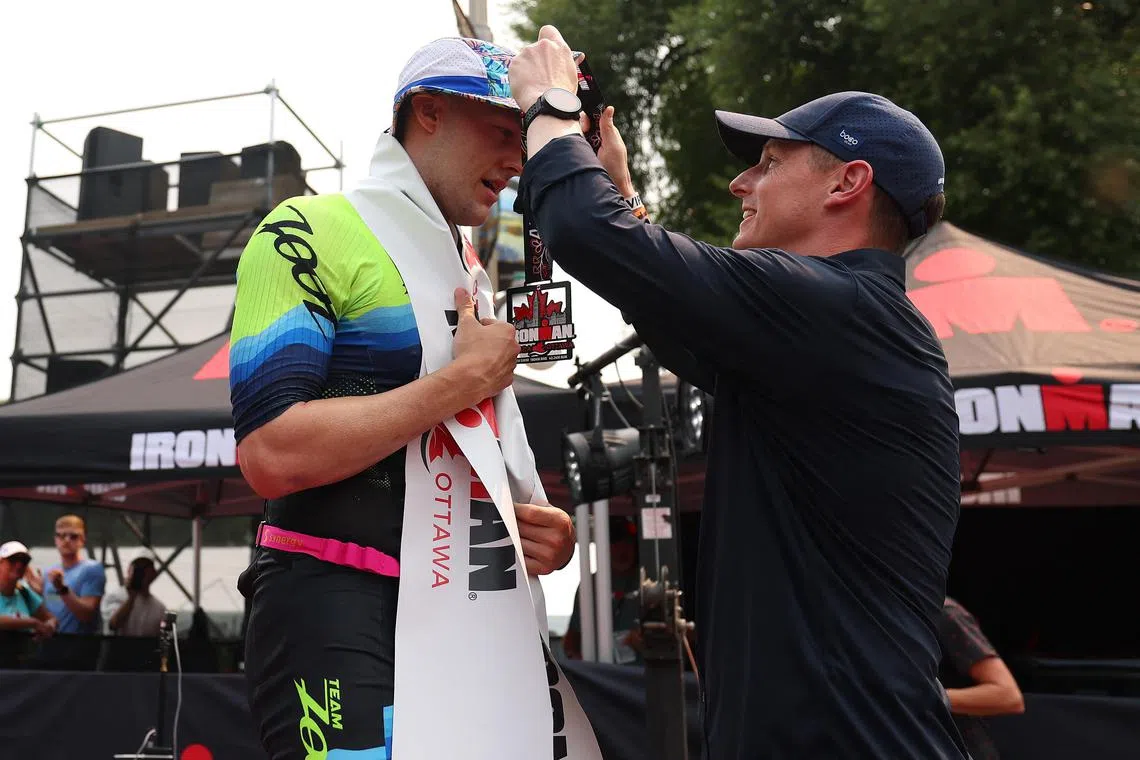Ironman CEO wants to turn the race organiser into a lifestyle brand
Sign up now: Get the biggest sports news in your inbox

Luke Evans of Canada receives his medal after winning Ironman Canada-Ottawa on Aug 3 in Ottawa, Ontario.
PHOTO: AFP
NEW YORK – Scott DeRue is one of only 500 or so people ever to summit the highest peak on each continent. He has also finished the Gobi March, a punishing 250km footrace in Mongolia.
But despite his athletic accomplishments, he has yet to complete a consecutive 3.9km swim, 180.2km bike ride and 42.2km run – an Ironman triathlon, the namesake race of the company DeRue leads. He’s been “more focused on the mountains,” he explains, a bit sheepishly. Next year, he promises, he will pull it off.
Since its first 15-person event in Waikiki, in Honolulu, in 1978, Ironman has grown into a globally recognised brand. In 2024, 200,000-plus brave souls registered to compete in an Ironman race – either the full Ironman or half Ironman – with double-digit growth recorded in several participant groups.
The United States had the most participants, followed by the United Kingdom, France, Germany and Australia.
“In our minds, we’re not just putting on events,” DeRue, 48, said during a recent hike outside Park City, Utah, where he keeps a home with his wife, two cats and two dogs, in addition to his main residence in Tampa, Florida, where the company is headquartered.
“We’re creating experiences for people that espouse a certain set of values.”
Like a triathlon race itself, Ironman Group LP is multi-faceted. The company boasts a sweat-drenched and ballooning portfolio. In addition to the Ironman triathlons, it owns the Rock ’n’ Roll Running Series; City2Surf; the Epic Series mountain bike races; and numerous events that are part of the Ultra-Trail du Mont-Blanc, considered the World Series of trail running.
In total, it organises more than 220 events annually in over 55 countries. The group aims to have “a million people a year crossing finish lines, which we’re pretty close to,” DeRue said.
One of the top goals for DeRue is transforming Ironman Group from a race organiser to more of a lifestyle brand. “You may only race with us once or twice a year, but you’re probably training year-round,” he said.
“We’re looking at how we can be a part of your life to help you along that journey.”
Take hospitality, for example. Ironman athletes often travel for races. What if Ironman Group ran a digital portal, kind of like Airbnb Experiences, where participants and their loved ones could sign up for local travel events before and after the big race?
“We don’t have to own all parts of the ecosystem,” he said. “But we can partner with others to enrich the athlete and fan experience and enrich the local community.”
Some of that push beyond races has already begun. Ironman Group sells clothes and other products, and it has inked splashy partnerships with the likes of sneaker maker Hoka, non-alcoholic beverage company Athletic Brewing and Swiss watchmaker Breitling.
And though DeRue is keen to expand the possibilities of the brand, he is also laser-focused on perfecting the fundamentals – the racers’ experience. To get a fix on details, he conducts what he calls “market research” by attending races. Often he participates, running, cycling or swimming in portions, peppering competitors with questions.
DeRue, who grew up in Wallburg, a rural town in North Carolina, has the bio of a serial overachiever. He had originally set out to become a medical doctor, but he quickly soured on the sciences at the University of North Carolina at Chapel Hill, because he “could not imagine spending that much time in a lab”.
After completing a dissertation in business management at Michigan State University, he eventually became a 39-year-old dean of the Stephen M. Ross School of Business at the University of Michigan.
Although he ditched a career in medicine, DeRue did not disregard his health. He had grown up playing basketball and ranked at the state level in pole vaulting. In college, he began running regularly.
Asked about the company’s performance under his tutelage, DeRue is mum, divulging only a top-line valuation of “hundreds of millions but not a billion”. It has about 550 full-time employees.
Looking ahead, DeRue has returned the Ironman World Championship to a one-day event in Hawaii, starting in 2026. Under previous leadership, the championship had been split into two days – one for men and one for women – to accommodate a backlog of deferred athletes after Covid-19 cancellations.
Not only did that shift irk some athletes, who felt it went against tradition, but it also strained the small town of Kona, which was overwhelmed with thousands of visitors over multiple race days. Ironman athletes so far seem to be placated.
He said: “There’s very strong opinions in the community about where the sport is going. But I’ve felt very welcomed.” BLOOMBERG


